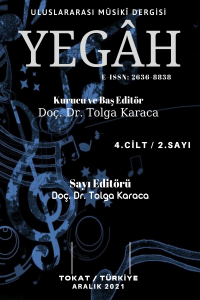Abstract
In this study, Kenneth S. Goldstein's doctoral thesis, whose original name is "A Guide for Field Workers in Folklore", was published in 1977 by Prof. Dr. His book titled “Folklore Compilation Methods in the Field”, translated into Turkish by Ahmet E. Uysal, was examined. This work was written in English in 1964 by the American folklorist Kenneth Goldstein. Determining compilation methods to carry out field research is an important step for a reviewer. The compiler can benefit from the written sources related to the region he works in order to reach the folklore material. However, it is necessary to do fieldwork in order to access some folklore information. It is very important which methods the compiler uses in the field studies. Although these methods vary according to the region and subject of the study, there are some basic methods that are considered to be the methods used by every compiler. The work named “Folklore Compilation Methods in the Field” draws attention to the fact that the compiler can reassign these methods with his own methods and experiences, and it consists of the methods that Goldstein created with the experiences he gained in his own field studies server, and the study is a method book containing basic information for a folklorist doing compilation work in the field. can be seen. Kenneth Goldstein's U.S.A. This book, which consists of the compilation methods that he has revealed as a result of his field studies in and Scotland, examines the written sources related to the field in which the compiler will work, starting from the very foundation of the preparations that a folklorist should make before going out on the field, and if another compiler has worked in the same field, he will meet with that compiler and examine his work, While going out for the field research, he draws attention to his accommodation, clothing, and even his communication with the source people, and deals with every detail until the last stage of the field research. The aim of the study is to discuss the compilation methods mentioned in the work named "Folklore Compilation Methods in the Field" in terms of their use today and their application in different geographies.
References
- Ay Göktan (1990) Folklora Giriş. İstanbul: Pan Yayıncılık.
- Boratav Pertev Naili (1973). 100 Soruda Türk Folkloru. İstanbul: Gerçek Yayınevi.
- Evliyaoğlu, Sait, Şerif, Baykurt (1987). Türk Halkbilimi. Ankara: Ofset Matbaacılık.
- Goldstein, Kenneth (1977). Sahada Folklor Derleme Metotları (Çev. Ahmet Uysal). Ankara: Başbakanlık Basımevi.
- Özdemir, Nebi (1998). “Kenneth S. Goldstein (1927-1995).” Milli Folklor, (37), 154-157.
Abstract
Bu çalışmada, Kenneth S. Goldstein ‘in asıl adı “A Guide for Field Workers in Folklore” olan doktora tezinin, 1977 yılında Prof. Dr. Ahmet E. Uysal tarafından Türkçeye çevrilen “Sahada Folklor Derleme Metotları” isimli kitabı incelenmiştir. Alan araştırmasını gerçekleştirmek için derleme metotlarının belirlenmesi bir derlemeci için önemli bir adımdır. Derlemeci folklor malzemesine ulaşmak için çalıştığı bölge ile ilgili yazılı kaynaklardan yararlanabilmektedir. Ancak bazı folklor bilgilerine erişmek için saha çalışması yapmak gerekmektedir. Yapılan saha çalışmalarında derlemecinin hangi metotları kullandığı oldukça önemlidir. Bu metotlar, çalışma yapılan bölgeye ve konuya göre değişkenlik gösterse dahi temel anlamda bazı yöntemler vardır ki bunlar her derlemecinin kullandığı metotlar olarak düşünülmektedir. “Sahada Folklor Derleme Metotları” isimli eser, derlemecinin bu metotları kendi yöntemleri ve tecrübeleriyle yeniden tayin edebileceğine dikkat çekmektedir ve Goldstein’in kendi saha çalışmaları sunucunda edindiği tecrübelerle oluşturduğu metotlardan oluşmaktadır ve çalışma sahada derleme çalışması yapan bir folklorcu için temel bilgileri içeren bir metot kitabı olarak görülebilmektedir. Kenneth Goldstein’in A.B.D. ve İskoçya’ da yaptığı saha çalışmaları sonucunda ortaya çıkardığı derleme metotlarından oluşan bu kitap, bir folklorcunun sahaya çıkmadan önce yapması gereken hazırlıların en temelinden başlayarak derlemecinin çalışacağı alan ile ilgili yazılı kaynakları incelemesine, başka bir derlemeci aynı alanda çalıştıysa o derlemeci ile görüşmesine, alan araştırmasına çıkarken konaklama yerine, giyimine, kaynak kişilerle olan iletişimine dahi dikkat çekerek alan araştırmasının son aşamasına kadar her ayrıntıyı ele almaktadır. Çalışmanın amacı, “Sahada Folklor Derleme Metotları” isimli eserde geçen derleme metotlarının günümüzde kullanılması ve farklı coğrafyalarda uygulanması açsından ele almaktır.
Supporting Institution
Kocaeli Üniversitesi Devlet Konservatuvarı
References
- Ay Göktan (1990) Folklora Giriş. İstanbul: Pan Yayıncılık.
- Boratav Pertev Naili (1973). 100 Soruda Türk Folkloru. İstanbul: Gerçek Yayınevi.
- Evliyaoğlu, Sait, Şerif, Baykurt (1987). Türk Halkbilimi. Ankara: Ofset Matbaacılık.
- Goldstein, Kenneth (1977). Sahada Folklor Derleme Metotları (Çev. Ahmet Uysal). Ankara: Başbakanlık Basımevi.
- Özdemir, Nebi (1998). “Kenneth S. Goldstein (1927-1995).” Milli Folklor, (37), 154-157.
Details
| Primary Language | Turkish |
|---|---|
| Subjects | Music |
| Journal Section | Articles |
| Authors | |
| Publication Date | December 28, 2021 |
| Submission Date | December 16, 2021 |
| Acceptance Date | December 18, 2021 |
| Published in Issue | Year 2021 Volume: 4 Issue: 2 |
Make sure you have an ORCID membership before submitting an article. If you do not have an Orcid, first click HERE to get yourself a membership. Otherwise, you cannot send an article. We wish you good work.

